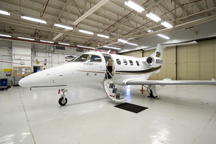Purdue jet to fly to international air show powered by biofuel
July 31, 2013
 |
|
The Purdue University Embrarer Phenom 100, powered partially by biofuel, will be at the 2013 Experimental Aircraft Association AirVenture. The flight demonstration is designed to promote more use of sustainable fuels in aviation throughout the Midwest. (Purdue University photo/Mark Simons) |
WEST LAFAYETTE, Ind. —Purdue pilots will fly the university's Embraer Phenom 100 jet to the Experimental Aircraft Association AirVenture in Oshkosh on Friday (Aug. 2), powered in part by a biofuel to demonstrate the potential of sustainable energy in aviation.
One of the jet's twin Pratt & Whitney engines will be filled with conventional jet aviation fuel while the other will contain a biofuel blend prepared by the U.S. Air Force.
"Aviation biofuels, some of which are approved for use today, are of interest due to their potential to reduce carbon emissions and be derived from non-petroleum sources such as renewable biomass," said Denver Lopp, professor of aviation technology and co-director of Purdue's Air Transport Institute for Environmental Sustainability (Air TIES).
The demonstration flight will be one of the first in the United States in which a university-owned jet will be powered by biofuels, said Air TIES co-director David Stanley, and represents an important milestone toward the long-term vision of operating a green training fleet at Purdue University.
Before and after the flight, key performance measurements will be studied and selected system inspections will be made. During the flight, engine and fuel system measurements will be compiled and corresponding data from previous research from the laboratory will be compared and analyzed as the basis for an exploratory paper on the use of biofuels in aircraft of this size. The biofuel Purdue is studying includes Camelina-based HEFA (hydroprocessed esters and fatty acid).
Purdue also will use a Honeywell TFE-109 turbofan engine to conduct extensive emission and performance tests on the same fuel supply from the Air Force. The Honeywell engine is similar in size and thrust as the engines on Purdue's Phenom 100.
The U.S. Air Force and the Air Force Research Lab have supported the Air TIES biofuels research by helping to develop advanced fuel testing capabilities over the past four years. The partnership with Purdue also involves providing biofuels for ongoing emissions and engine operations tests at the National Test Facility for Fuels and Propulsion in the Niswonger Aviation Technology Building at the Purdue University Airport.
The demonstration flight, intended to accelerate interest in future biofuel use in the Midwest, emerged from Purdue's involvement in the Midwest Aviation Sustainable Biofuels Initiative. Pilot Lisa Lewis, director of flight operations at Purdue Airport, will be joined in the cockpit by student co-pilot, Braxton Baker. Air TIES uses student researchers on their projects because they are the next generation of aviation leaders.
"This demo flight using a university light jet in an educational setting is truly representative of a new generation of pilots and fuels," said Rich Simmons, Air TIES executive director for research. "Along with other research aimed at the deployment of sustainable low-carbon aviation fuels, this flight can help focus attention on innovative solutions to key energy and environmental challenges facing aviation. It's rewarding to see these visions of tomorrow taking flight today."
Founded in 2011, Air TIES features interdisciplinary efforts across Purdue's campus to advance sustainable and cost-competitive biofuels. The center provides expertise throughout the biofuel supply chain. Air TIES continues its cooperative efforts with industry, government and educational organizations to better understand economic and environmental impacts and achieve tangible progress for aviation biofuel production in the Midwest. Air TIES and select Purdue faculty will partner with Mercurius Biofuels on a recently announced U.S. Department of Energy-funded $4.6 million research project. The company will this fall begin the design of a pilot plant to produce renewable aviation fuels from corn stover in the region.
Writer: Jim Schenke, 765-494-6262, jschenke@purdue.edu
Sources: David Stanley, 765-494-6226, dlstanley@purdue.edu
Denver Lopp, 765-494-6387, denver@purdue.edu
Rich Simmons, rsimmons@purdue.edu
Related website:
EAA

